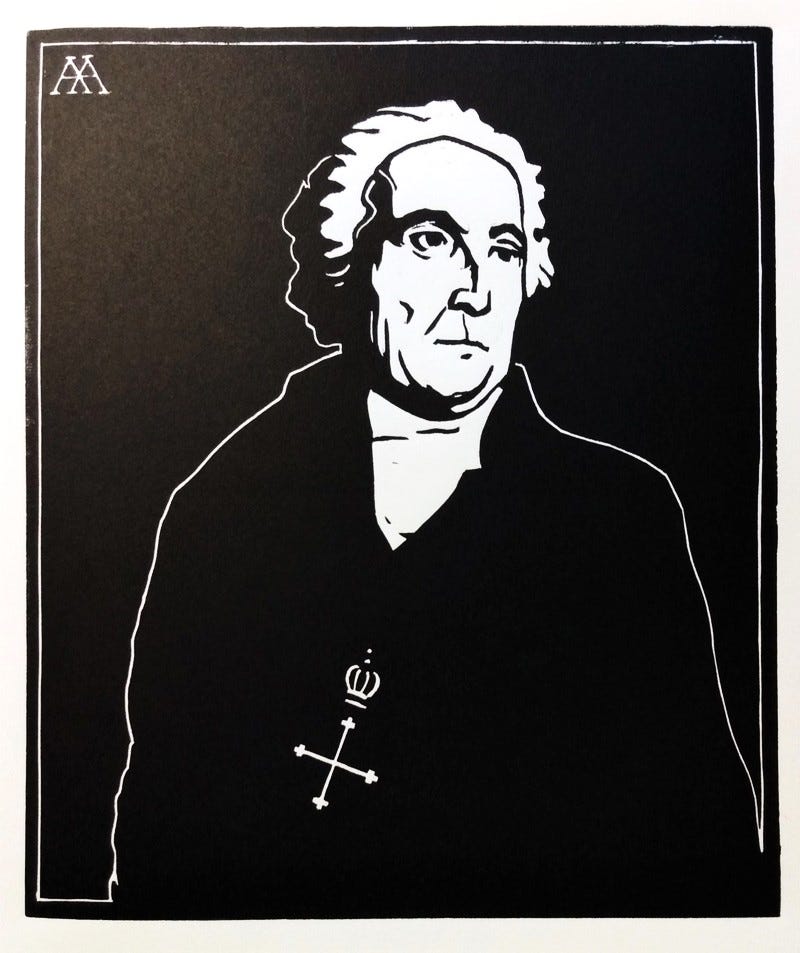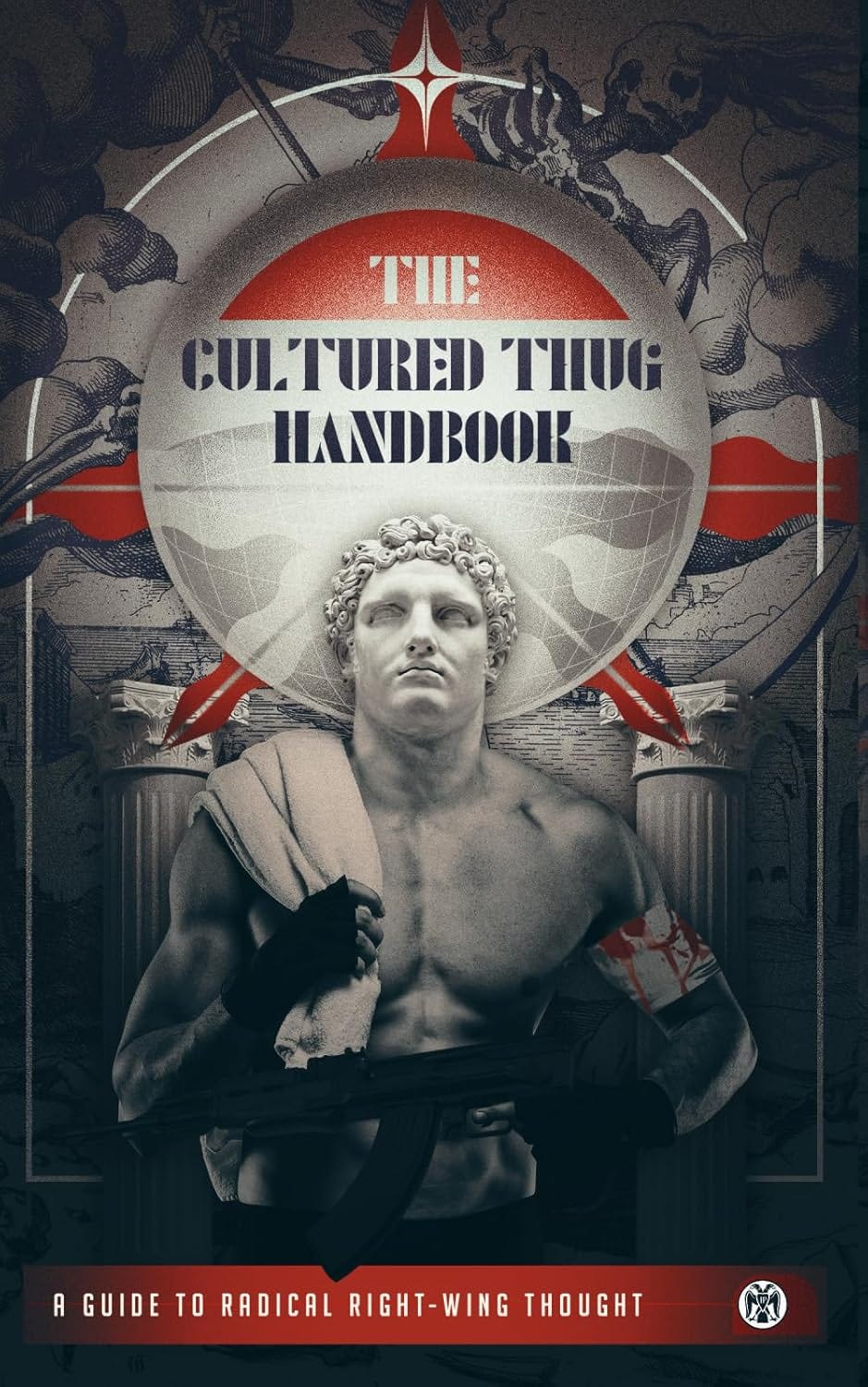Rules for Reactionaries: a primer in anti-liberalism
"The Cultured Thug" is a startling and powerful articulation of a worldview becoming ever more important to appreciate.
Mike Maxwell, The Cultured Thug Handbook: A Guide to Radical Right-Wing Thought, Imperium Press, November 2024, paperback, 443pp + ix, $23, ISBN 978 1 923104 518
“Truthfully, in this age, those with intellect have no courage and those with some modicum of physical courage have no intellect. If things are to alter during the next fifty years, then we must re-embrace Byron’s ideal: the cultured thug.”[i]
This quote from Jonathan Bowden opens a new guide for those interested in understanding discourse on what is usually called the “dissident right” or the “neo-reactionaryism”. In this book, Mike Maxwell (publisher of anti-liberal and traditionalist texts at Imperium Books) sets out clearly what is meant by terms commonly used on the right. While conservativism is (broadly speaking) a reluctant liberalism, the actual right advocates a different understanding of human nature and society. Maxwell draws deep on his reading of ancient civilisations to augment more recent writings. He writes as often about tribes as modern politics.
In this review, I will treat the reactionary viewpoint as worthy of serious consideration so that I can judge the book as not only advocacy but as explanation, of interest to outsiders. The book is divided into three sections: the 10-step program (core rightist principles), illiberal concepts (examples and arguments against liberalism) and the big ideas (the distilled theses of great men). The arrangement works well, as it builds up one’s understanding of anti-liberal thinking, which is often a contradictory and many-facetted field. The right has some shared values but the arguments and remedies for today’s problems are fractured because analyses and ideologies developed independently and (when they spring from religious or tribal bases) they are mutually incompatible.
“The radical right owns the history of ideas, because what it stands for is just what great men have always said.”[ii] To support this, Maxwell marshals Homer, Heraclitus, Aristotle, Confucius, Ibn Khaldun, alongside more recognisably right-wing figures such as Carlyle, Spengler, Schmitt and Evola. He acknowledges the correctness of some leftist critiques (which in turn drew upon some radical right thinkers), especially in the area of economics. The actually right-wing critique of capitalism is the danger of international finance (mobile, vampiric, antithetical to national autonomy and self-interest) and the deracinating impact of laissez-faire policies, which untether men from their land and accelerate the homogenisation of regional and family industries.
Maxwell describes what is called reactionary, neo-reactionary or far right as the “deep centre”, as their beliefs (currently marginalised as extreme) have existed as the core of ethics and social organisation for the vast majority of humanity’s existence – even up to the Twentieth Century. They preceded (and no doubt, will outlive) Western liberalism. It is today’s liberalism, capitalism and socialism (and its offspring of corporate oligarchy) that is the historical aberration. The tribe – with its gods, its traditions, its lands – provided the organising matrix through which men and women shaped society, always conscious of hierarchy, inequality, partiality and the superiority of their creed. All over the world, we find traditional societies that shared these principles that were expressed in differing manners. That shared fierce tribal loyalty alone is a constant human universal.
Some on the left will find points of commonality with the right, namely the impossibility of individualism as an organising principle and the importance of collectivism, the corrosive effect of international finance and suspicion of the deep state. However, although the right is always concerned about the managerialism of centralised bureaucracy, the left believes that if bureaucracy is ideologically captured then it will provide a means of control. In this sense, the organisational outlook of the Nazis is antipathetical to the reactionary, who sees managerialism per se as sapping the vitality of man and deleterious to the expression of deeper loyalties. The modern nation state requires a centralised system of management, even if the head be a king or priest. This seems an insoluble problem that the right grapples with. The concept of bioleninism – where a ruling elite draws its staff and enforcers on the basis of loyalty not competence – identifies a failing of the left in an advanced liberal society. Society becomes ever more dysfunctional as the least capable members are given power and decision-making capacities. (“Loyalty, not merit, is the lifeblood of organizations. Men would rather die than suffer low status. The most loyal are those with chronically low status.”[iii])
Another area left and right agree on is the way liberal societies “obscure who is in charge”, specifically “continuity between public and private […] who makes decisions in government […] the sovereign [and] how power dynamics work.”[iv] Elite theory allows the rightist to understand that grassroots activism never makes change unless it is organised, directed and allied to a counter-elite willing to act to take power. This is a point that leftists admit publicly only grudgingly, if they will admit it at all.
Conservatives will find relatively little comfort – and a great deal of discomfort – in deep centrism. When it comes to Chesterton’s Fence (the observation that the progressive is set on dismantling barriers for which they do not see a purpose), we see a rare alignment between what “far right” and moderate right. “Tradition is just the experience of billions of man-hours distilled into priceless gems that we have inherited.”[v] Progressives and socialists see traditionalists as toothless and easily intimidated. In contrast, Maxwell suggests that it is the radical right’s lack of fear of science and technology makes it uniquely feared. Conservatives have failed to hold ground – let alone retake ground – from incremental gains of the left, something of which progressives, liberals and libertarians are well aware.
Maxwell argues it was the near-global lockdown of COVID-19 that stripped away the last vestiges of liberalism’s propaganda. The myth of objective journalism in the mainstream media bringing the truth to the people (when in fact the MSM colluded with governments, NGOs and big pharma) was exploded. And, as Maxwell notes, even when the truth came out about the US government censoring social media and directing the “free” press, nothing happened. Scandals that would have staggered our grandparents elicited nothing other than passive acknowledgement, because the people are led not sovereign.
Cuttingly, Maxwell calls liberalism a “one weird trick” worldview, which sets out to invert all of mankind’s most essential tenets. What if we discarded borders and refused to distinguish between men and women and between countryman and foreigner? What if we treated everyone as (nominally) equal and valuable and based our worldview upon exceptions? What if we were moral-social universalists not particularists? What if we chose or achieved identities rather than inheriting them or having roles allotted to us by society? Liberalism looks like deliberate sabotage when we see the alacrity with which Chesterton’s Fences have been systematically dismantled, accompanied by jubilation.
Maxwell cites examples to justify points and provides endnotes. Each short chapter gets bullet-point summaries. Full references, a bibliography and index allow readers to trace paths to new knowledge. His prose is accessible, his pacing brisk. In his style, Maxwell has more than a little in common with Bowden – the popular references, down-to-earth language, rhetorical force, earnest didacticism, pertinent facts and occasional erudite references. Dashes of science, economics and obscure etymology pepper the volume and further enliven the already stimulating discussion, drawing everyday life, ancient texts and new data into the narrative. There is barely a page without a profound insight or elegantly truthful epigram. This book contains so many serious ideas and radical views on not only politics and society, but economics, science, philosophy and existence that it acts as an intellectual education – albeit one centred on a particular stance – that it will shake some of the assumptions of even a well-informed reader.
For those friendly and those hostile towards the right, whether they agree or vehemently oppose the radical right (or deep centre), The Cultured Thug is a startling and powerful articulation of a worldview that is becoming ever more important to appreciate.
[i] Quoted p. 3
[ii] P. 390
[iii] P. 113
[iv] P. 28
[v] P. 45
[vi] P. 167
[vii] P. 168



‘Scandals that would have staggered our grandparents elicited nothing other than passive acknowledgement because the people are led not sovereign.’ Isn’t that the truth. I’ve felt doleful and a bit weary watching the growing petition, demanding another General Election. The UK Parliament will debate the proposal on 25th January 2025. What a farce, or rather a pantomime given the season. Of course the government are dreadful. Of course they told lots of lies to get elected - as per the lie told to the ‘WASPI’ women (revealed yesterday by government minister Liz Kendall). Of course there’s nothing you can do about it - you are not sovereign.
Maxwell rightly calls liberalism a ‘one weird trick worldview’ which sets out to invert all mankind’s central tenets. He’s not wrong. It’s brought us to a dreadful place. Earlier this week, I published a Substack on the Only Fans creator Lily Phillips and her recent sexual stunt. https://open.substack.com/pub/ladyofshalott2/p/its-not-for-the-weak-girls-from-annabel?r=18oo7k&utm_medium=ios
What kind of a world do we live in when anyone thinks this sort of stuff is ok? Many, many people don’t think it’s ok going by the reaction Josh Peiters’ documentary on Phillips has received. But she’s making a lot of money from the monetisation of what was once held by society as intimate. And money doesn’t just talk it screams, as Bob Dylan said. This is where we are. It has been deliberate sabotage by liberalism. My grandparents must be spinning in their graves and so is Chesterton.
Excellent article as ever Alexander - thank you. A very blessed Christmas to you and yours and to all your readers.
Well, for a start what a gripping title, and an equally accurate read. Do you happen to follow Christian Heines on X? He calls liberalism ‘the universal solvent’, and I think you’d have a lot in common.
It reminds me of the Postmodernist Drinking Song by Jordan Peterson: https://youtu.be/iQTDEnfW4ng